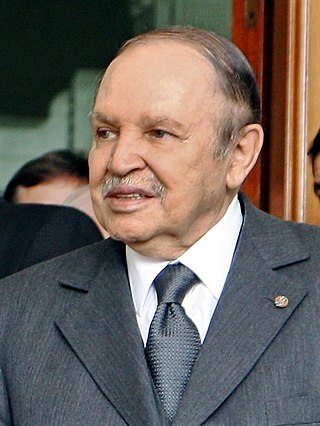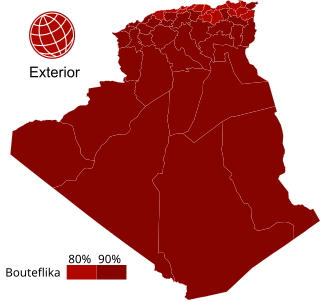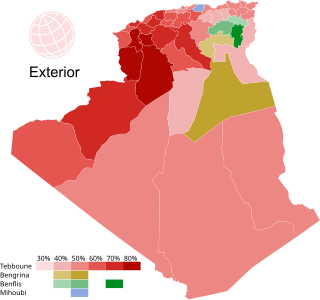| |||||||||||||||||
| Registered | 17,488,759 | ||||||||||||||||
|---|---|---|---|---|---|---|---|---|---|---|---|---|---|---|---|---|---|
| Turnout | 60.91% | ||||||||||||||||
| |||||||||||||||||
| |||||||||||||||||
 |
|---|
Contents |
Presidential elections were held in Algeria on 15 April 1999. Abdelaziz Bouteflika was elected with 74% of the vote after the other six candidates withdrew on the eve of the elections.
| |||||||||||||||||
| Registered | 17,488,759 | ||||||||||||||||
|---|---|---|---|---|---|---|---|---|---|---|---|---|---|---|---|---|---|
| Turnout | 60.91% | ||||||||||||||||
| |||||||||||||||||
| |||||||||||||||||
 |
|---|
Contents |
Presidential elections were held in Algeria on 15 April 1999. Abdelaziz Bouteflika was elected with 74% of the vote after the other six candidates withdrew on the eve of the elections.
Incumbent president Liamine Zéroual announced in September 1998 that early presidential elections would be held in February 1999. He also said that he would not be a candidate, in a move which was reported as being due to infighting within the Algerian army. [1] The election date was later set for 15 April and the official campaign began on 25 March. [2] The government set up the Independent National Commission for Monitoring the Presidential Election (CNISEP) to oversee the elections, and Zéroual called upon all government officials to remain neutral. [3]
The elections took place amidst a backdrop of continuing conflict in the Algerian Civil War. Restoring peace to the country was the major election issue. [2]
The frontrunner was former foreign minister, Abdelaziz Bouteflika, who was supported by much of the military and establishment. Bouteflika had the backing of the two main parties in the governing coalition and said that he would work to increase trust in the government and would not rule out talking to anyone. [2] Pro-government newspapers described Bouteflika as the "national consensus candidate". [4]
The other candidates included Ahmed Taleb Ibrahimi, a former education and foreign minister, who received backing from the outlawed Islamic Salvation Front (FIS). He supported talking with the FIS and for the military to withdraw from politics. Another candidate Abdallah Djaballah, the founder of the Movement for National Reform, called for a government of national unity to be formed. [5]
Two former prime ministers were candidates. Mouloud Hamrouche, prime minister from 1989 to 1991 was a former member of the governing National Liberation Front (FLN) who had fallen out with the leaders of the party. Mokdad Sifi was prime minister from 1993 to 1995 and was backed by part of the National Rally for Democracy (RND) which did not support Bouteflika. He opposed an amnesty or negotiations with murderers of women and children. [5]
Youcef Khatib was an independent candidate and former advisor to Zéroual's 1995 election campaign. Hocine Aït Ahmed, the founder of the Socialist Forces Front, campaigned by calling for Algeria to be neither a military dictatorship or Islamic fundamentalist state. Near the end of the campaign Ahmed had a heart attack and had to go to Switzerland for treatment. [5]
Fewer than 24 hours before the elections, all candidates except Bouteflika withdrew, claiming the vote would not be fair. [6] The candidates claimed that electoral fraud by the army ensured that Bouteflika would win the election, and that voter lists were being padded and extra ballot papers being printed to support Bouteflika. [7] The United States said they were disappointed with how the election occurred and was a 'step back' for democracy. [8]
Zéroual refused to meet the candidates to discuss their grievances and criticised them for withdrawing, describing the move as illegal. [6] [9]
Official figures showed turnout to be 61% with Bouteflika winning easily. However, the other candidates claimed that turnout was much lower, with Ibrahimi estimating it had only been around 25%. [9]
| Candidate | Party | Votes | % | |
|---|---|---|---|---|
| Abdelaziz Bouteflika | National Liberation Front | 7,445,045 | 73.76 | |
| Ahmed Taleb Ibrahimi | Independent | 1,265,594 | 12.54 | |
| Abdallah Djaballah | Movement for National Reform | 400,080 | 3.96 | |
| Hocine Aït Ahmed | Socialist Forces Front | 321,179 | 3.18 | |
| Mouloud Hamrouche | Independent | 314,160 | 3.11 | |
| Mokdad Sifi | Independent | 226,139 | 2.24 | |
| Youcef Khatib | Independent | 121,414 | 1.20 | |
| Total | 10,093,611 | 100.00 | ||
| Valid votes | 10,093,611 | 94.75 | ||
| Invalid/blank votes | 559,012 | 5.25 | ||
| Total votes | 10,652,623 | 100.00 | ||
| Registered voters/turnout | 17,488,759 | 60.91 | ||
| Source: Psephos | ||||

The History of Algeria from 1962 to 1999 includes the period starting with preparations for independence and the aftermath of the independence war with France in the 1960s to the Civil War and the 1999 presidential election.

The president of the People's Democratic Republic of Algeria is the head of state and chief executive of Algeria, as well as the commander-in-chief of the Algerian People's National Armed Forces.

Abdelaziz Bouteflika was an Algerian politician and diplomat who served as the seventh president of Algeria from 1999 to his resignation in 2019.

Ahmed Ouyahia is an Algerian politician who was prime minister of Algeria four times. A career diplomat, he also served as Minister of Justice, and he was one of the founders of the Democratic National Rally (RND) as well as the party's secretary-general. He is considered by Western observers to be close to the military of Algeria and a member of the "eradicator" faction in the 1990s civil war against Islamist militants. Ouyahia resigned as prime minister in March 2019 following President Bouteflika's announcement that he would not seek reelection, and Ouyahia was arrested in June 2019 for crimes related to corruption. He was later convicted and is currently serving 19 years in jail.

The Movement of Society for Peace, sometimes known by its shortened form Hamas, is a Sunni Islamist party in Algeria, led by Mahfoud Nahnah until his death in 2003. Its current leader is Abderrazak Makri. It is an offshoot of the Muslim Brotherhood.

Ali Benflis is an Algerian politician who was Head of Government of Algeria from 2000 to 2004. In 2003, he became the general secretary of the National Liberation Front party. Benflis was a candidate in the 2004 presidential election, but the poll resulted in the re-election of Abdelaziz Bouteflika. Benflis ran yet again as an independent candidate in the 2014 Algerian presidential elections held on 17 April 2014. The result was that Abdelaziz Bouteflika was reelected as president with 81.53% of the votes, with Benflis ending as runner-up with 12.18%.

Abdelaziz Belkhadem is an Algerian politician who was Prime Minister of Algeria from 2006 to 2008. He was also Secretary-General of the National Liberation Front (FLN). Belkhadem served as Minister of Foreign Affairs from 2000 to 2005 and Personal Representative of President Abdelaziz Bouteflika from 2005 to 2006; after serving as Prime Minister from 2006 to 2008, he was again appointed as Personal Representative of the Head of State in 2008.

The Algerian Civil War, known in Algeria as the Black Decade, was a civil war fought between the Algerian government and various Islamist rebel groups from 11 January 1992 to 8 February 2002. The war began slowly, as it initially appeared the government had successfully crushed the Islamist movement, but armed groups emerged to declare jihad and by 1994, violence had reached such a level that it appeared the government might not be able to withstand it. By 1996–97, it had become clear that the Islamist resistance had lost its popular support, although fighting continued for several years after.

Ahmed Taleb Ibrahimi is an Algerian politician and intellectual.

Parliamentary elections were held in Algeria on 30 May 2002 to elect members of the People's National Assembly. The governing National Liberation Front (FLN) won a majority of seats in the election. The election suffered from a low turnout, violence and boycotts by some opposition parties.

Presidential elections were held in Algeria on 9 April 2009. The result was a victory for incumbent President Abdelaziz Bouteflika, who was re-elected with 90% of the vote.
Events from the year 2007 in Algeria.

Abdelmalek Sellal is an Algerian politician who was Prime Minister of Algeria from 3 September 2012 to 13 March 2014 when he took a leave of office to support President Abdelaziz Bouteflika's re-election campaign and again from April 2014 to May 2017.

Presidential elections were held in Algeria on 17 April 2014. Incumbent President Abdelaziz Bouteflika was re-elected with 82% of the vote. Issues in the campaign included a desire for domestic stability after the bloody civil war of the 1990s, the state of the economy, the frail health of the 15 year incumbent and 77-year-old president whose speech was "slurred and inaudible" in his only public outing during the campaign, and the less-than-wholehearted support given the president by the normally united and discrete ruling class.

Presidential elections were held in Algeria on 12 December 2019. The election had originally been scheduled for 18 April, but was postponed due to sustained weekly protests against plans by the incumbent president Abdelaziz Bouteflika to run for a fifth term. Bouteflika resigned on 2 April and Abdelkader Bensalah was elected acting president by parliament a week later. On 10 April the election was rescheduled for 4 July. On 2 June the Constitutional Council postponed the elections again, citing a lack of candidates. A new electoral authority, Autorité nationale indépendante des élections (ANIE), was created in mid-September as an alternative to the existing Haute instance indépendante de surveillance des élections (HIISE) defined by the 2016 constitution. The election was rescheduled for 12 December 2019 and ANIE, of disputed constitutional validity, announced five valid candidates on 2 November. In their 200000 strong protest on 1 November, Algerian protestors rejected the 12 December election and called for a radical change in the system to take place first. The Forces of the Democratic Alternative (FDA) alliance and the Justice and Development Front also called for boycotting the 12 December election, and the FDA called for creating a constituent assembly.

The 2019–2021 Algerian protests, also called Revolution of Smiles or Hirak, began on 16 February 2019, six days after Abdelaziz Bouteflika announced his candidacy for a fifth presidential term in a signed statement. These protests, without precedent since the Algerian Civil War, were peaceful and led the military to insist on Bouteflika's immediate resignation, which took place on 2 April 2019. By early May, a significant number of power-brokers close to the deposed administration, including the former president's younger brother Saïd, had been arrested.

Abdelaziz Djerad is an Algerian politician and diplomat who served as Prime Minister of Algeria from 28 December 2019 to 30 June 2021. In September 2021, he was appointed ambassador to Sweden.
Ali Yahia Abdennour was an Algerian politician, lawyer and human rights activist.
Saïd Bouteflika is an Algerian politician and academic. He is the brother and was a special adviser of Abdelaziz Bouteflika in his former role as President of Algeria, on whom he would have had "considerable influence", especially after the president suffered a serious stroke in 2013. He was also an assistant professor at the University of Science and Technology Houari Boumediene (USTHB).

A constitutional referendum was held in Algeria on 1 November 2020. The subject of the referendum was a revision of the Algerian constitution, and it follows a series of protests known as Hirak.